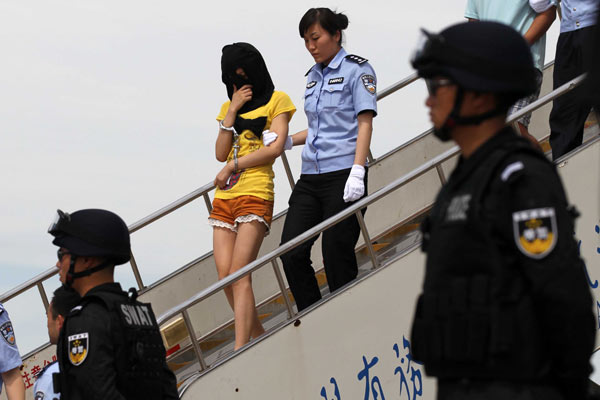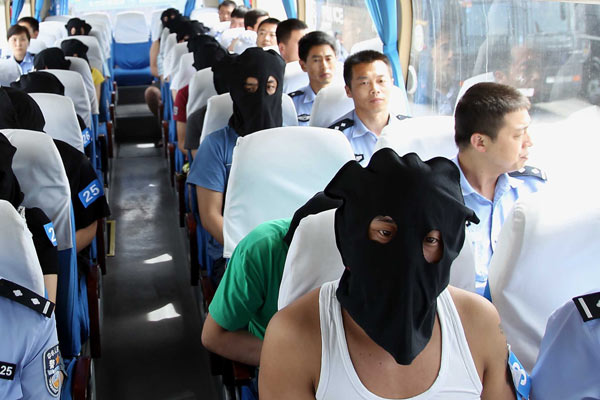Fraud suspects transferred
Updated: 2012-05-25 07:24
By Zhang Yan (China Daily)
|
||||||||
Malaysian and Thailand authorities transferred 126 Chinese mainlanders who were allegedly involved in a transnational telephone fraud to mainland police on Thursday, according to the Ministry of Public Security.
They arrived in Beijing from Kuala Lumpur and Bangkok on two chartered flights, said Wen Guohui, press officer from the ministry.
 |
|
Suspects in an international telecom fraud arrived in Beijing on Thursday. The 126 men and women were handed over to Chinese police by Malaysian and Thai police, the Ministry of Public Security said. Photo by Wang Jing / China Daily |
On Wednesday, mainland police, assisted by Taiwan police, worked with their counterparts in Thailand, Malaysia, Indonesia, Cambodia, Sri Lanka and Fiji to bust a large cross-border telephone scam gang, he said.
"On early Wednesday, police from these countries and regions carried out a cross-regional arrest action," Yang Dong, deputy director of the criminal investigation department under the ministry, told China Daily.
Police arrested 482 suspects, including 177 people from the Chinese mainland, 286 from Taiwan and 19 from Thailand and Myanmar, who allegedly were connected with 510 telecom swindling cases, and cheated Chinese victims out of 73 million yuan ($11 million) from 2010 to 2011, Yang said.
"The operation is a major success in international judicial cooperation," Yang said.
The fraud case unraveled in November, when a financial manager surnamed Sha from an investment company in Suzhou, East China's Jiangsu province, reported to local police that she had been swindled for 12.6 million yuan through telephone fraud.
After the investigation, police discovered that the swindler who called Sha pretended to be a local police officer.
Over the next three days, the suspects again pretended to be staff from an anti-money laundering special work team, and asked Sha to transfer the company's financial fund to a "safe" designated account, which Sha did.
In early May, the ministry sent six investigation teams consisting of 70 police officers to the six countries to assist them with gathering evidence and making arrests.
Yang said the suspects were based in Taiwan and funded the whole fraud operation. Others were divided into several major groups, including phone calls, network maintenance, and specialists in withdrawing, transferring and laundering money.
"The ring leaders bought or rented network servers and equipment to set up the host computer and circuits in Taiwan, and calling bases were scattered in Thailand, Malaysia, Cambodia, Indonesia and even Fiji," he said.
"Meanwhile, they mainly hired unemployed young men from the Chinese mainland, who were cheated to work abroad with high salaries with tourist visas, and received formal training to form a complete fraud operation," Yang said.
Telephone fraud has become a major social security problem on the Chinese mainland, but suspects often use overseas servers and make phone calls from overseas, making it more difficult for mainland police to trace them, Yang said.
"Therefore, cooperation with overseas police is important to crack down on telephone fraud groups," he said.
Dai Peng, director of the criminal investigation department under the Chinese People's Public Security University, agreed.
 |
|
Suspects of a transnational telephone fraud are transferred to the Chinese mainland at Beijing Capital International Airport on Thursday. Wang Jing / China Daily |
"Swindlers frequently change their crime methods and shift their fraud dens to avoid the police, and the fraud shelters have been spreading to countries in South Asia and Oceania rather than traditional destinations such as Chinese mainland, Taiwan, Thailand, Malaysia and Cambodia."
"The mainland should intensify bilateral police cooperation with these countries and regions, and fight against the illegal disclosure of personal information to prevent fraudsters from easily getting people's phone numbers," he said.
Li Guifang, deputy director of the criminal defense committee of the All China Lawyers Association, said a suspect convicted of common fraud will face a jail term of up to three years.
But if the amount of money involved is 30,000 yuan to 100,000 yuan, the sentence can range from three to 10 years, he said.
"A sentence of 10 years to life in prison is possible if the case is deemed serious ... for example, if the amount of money involved is more than 500,000 yuan, or the fraud results in someone's death or the victim's loss of sanity," he said.
Contact the reporter at zhangyan1@chinadaily.com.cn

 Relief reaches isolated village
Relief reaches isolated village
 Rainfall poses new threats to quake-hit region
Rainfall poses new threats to quake-hit region
 Funerals begin for Boston bombing victims
Funerals begin for Boston bombing victims
 Quake takeaway from China's Air Force
Quake takeaway from China's Air Force
 Obama celebrates young inventors at science fair
Obama celebrates young inventors at science fair
 Earth Day marked around the world
Earth Day marked around the world
 Volunteer team helping students find sense of normalcy
Volunteer team helping students find sense of normalcy
 Ethnic groups quick to join rescue efforts
Ethnic groups quick to join rescue efforts
Most Viewed
Editor's Picks

|

|

|

|

|

|
Today's Top News
Health new priority for quake zone
Xi meets US top military officer
Japan's boats driven out of Diaoyu
China mulls online shopping legislation
Bird flu death toll rises to 22
Putin appoints new ambassador to China
Japanese ships blocked from Diaoyu Islands
Inspired by Guan, more Chinese pick up golf
US Weekly

|

|






